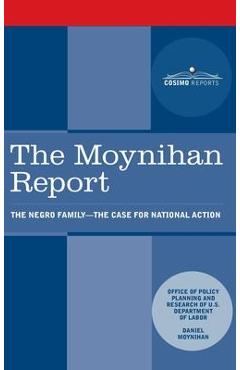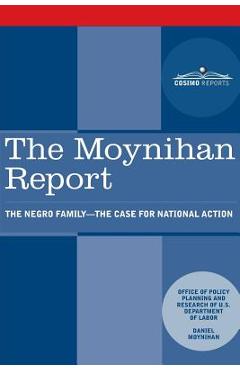Moynihan Report: The Negro Family: The Case for National Action - U. S. Department Of Labor

Detalii Moynihan Report: The Negro Family:
libris.ro
223.13 Lei
247.92 Lei
Social Science
U. S. Department Of Labor
Moynihan Report: The Negro Family: - Disponibil la libris.ro
Pe YEO găsești Moynihan Report: The Negro Family: de la U. S. Department Of Labor, în categoria Social Science.
Indiferent de nevoile tale, Moynihan Report: The Negro Family: The Case for National Action - U. S. Department Of Labor din categoria Social Science îți poate aduce un echilibru perfect între calitate și preț, cu avantaje practice și moderne.
Preț: 223.13 Lei
Caracteristicile produsului Moynihan Report: The Negro Family:
- Brand: U. S. Department Of Labor
- Categoria: Social Science
- Magazin: libris.ro
- Ultima actualizare: 08-04-2025 01:30:25
Comandă Moynihan Report: The Negro Family: Online, Simplu și Rapid
Prin intermediul platformei YEO, poți comanda Moynihan Report: The Negro Family: de la libris.ro rapid și în siguranță. Bucură-te de o experiență de cumpărături online optimizată și descoperă cele mai bune oferte actualizate constant.
Descriere magazin:
The fundamental problem... is that of family structure. The evidence--not final but powerfully persuasive--is that the Negro family in the urban ghettos is crumbling. --From the introduction to The Moynihan Report , 1965 Against the backdrop of President Johnson\'s War on Poverty and the Watts riots in Los Angeles, a young civil servant with the OFFICE OF PLANNING AND RESEARCH at the Department of Labor, DANIEL P. MOYNIHAN, wrote in 1965 his most controversial study The Moynihan Report--The Negro Family: The Case for National Action . This report drew widespread attention from critics and supporters alike. It concluded that the conditions under which black children were being raised, generally in single-mother households, were the leading cause of black poverty. As Moynihan wrote decades later: The work began in the most orthodox setting, to establish at some level of statistical conciseness what \'everyone knew\' that economic conditions determine social conditions. Whereupon, it turned out that what everyone knew was evidently not so. Although Moynihan was a liberal politician and the report called for jobs programs and vocational training for blacks, many black and civil rights leaders found his report patronizing and that it relied on stereotypes of the black family and black men. The 1965 statistics, when approximately 25 percent of black babies were born out of wedlock, have not improved 50 years later, when this percentage has grown to 75 percent--with 50 percent for Hispanic babies and 29 percent for white babies. Also in other areas, such as income, employment, and incarceration, the statistics have deteriorated for blacks. The legacy of The Moynihan Report is that the debate it launched around cultural causes of black poverty is still not settled in modern day America.

Produse asemănătoare

The Moynihan Report: The Negro Family - The Case for National Action - U. S. Department Of Labor
![]() libris.ro
libris.ro
Actualizat in 05/06/2025
133.85 Lei
Produse marca U. S. Department Of Labor

The Moynihan Report: The Negro Family - The Case for National Action - U. S. Department Of Labor
![]() libris.ro
libris.ro
Actualizat in 05/06/2025
133.85 Lei

Moynihan Report: The Negro Family: The Case for National Action - U. S. Department Of Labor
![]() libris.ro
libris.ro
Actualizat in 08/04/2025
223.13 Lei